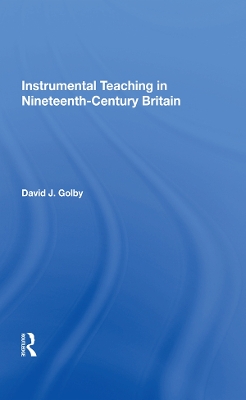It is a truth widely acknowledged that, while part of a uniquely diverse and vibrant musical environment, the achievements of home-grown British instrumentalists in the nineteenth century gave little cause for national pride. Drawing together information from a wide variety of primary and secondary sources, in particular treatises and tutors, David Golby demonstrates that while Britain produced many fewer instrumental virtuosi than its foreign neighbours, there developed a more serious and widespread interest in the cultivation of music throughout the nineteenth century. Taking a predominantly historical approach, the book moves from a discussion of general developments and issues to a detailed examination of violin pedagogy, method and content which is used as a guide to society's influence on cultural trends and informs the discussion of other instruments and institutional training that follows. In the first study of its kind Dr Golby examines in depth the inextricable links between trends in society, education and levels of achievement. He also extends his study beyond professional and 'art' music to incorporate the hugely significant amateur and 'popular' spheres. To provide a contextual framework for the study, the book includes a chronology of developments in 19th-century British music education, and a particularly useful feature for future researchers in this field is a representative chronology of principal British instrumental treatises 1780-1900 that features over 700 items.
- ISBN13 9781351155588
- Publish Date 18 January 2018 (first published 22 December 2017)
- Publish Status Active
- Publish Country GB
- Publisher Taylor & Francis Ltd
- Imprint Routledge
- Format eBook (EPUB)
- Pages 379
- Language English
